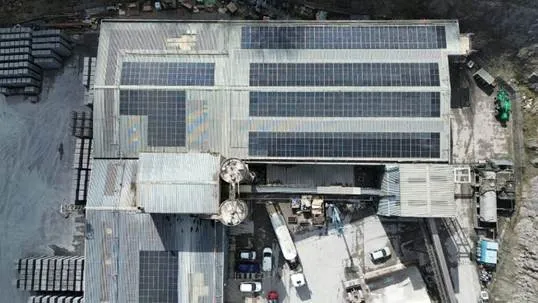
Holcim UK has continued its renewable energy roll out with its latest installation at one of its sites in Somerset. The firm has introduced solar technology to its Callow Plant near Cheddar, which is home to a hard rock aggregate quarry, readymix concrete plant and building products blocks factory.
A total of 464 solar panels have been installed as part of its ongoing renewable energy installation project on the roof of the site’s block factories. The project, managed by Regenerco with installation carried out by Aniron, will be able to generate more than 167,000 KWh of power per year, equating to 8% of the site’s annual power needs and resulting in a saving of 15.6 tonnes of CO2 emissions per year.
The introduction of more renewable energy sources is a key part of the company’s net zero strategy which aims to achieve zero emissions before 2050. It follows on from rooftop installations at its Huland Ward and Bardon Hill sites in the last 12 months. Luke Olly, Head of Decarbonisation at Holcim UK, said: “We welcome the latest solar installation at one of our UK sites, the first as Holcim UK, and to maintain the momentum that has been created.
“Renewable energy is one of the key components of our net-zero strategy and the more schemes we introduce the more clean energy we can produce, lowering carbon emissions and making our sites more self-sufficient.
“We are already working on a number of further schemes in the pipeline for the rest of 2025 as we continue our journey to net-zero.”
Nigel Price, Director at Burton-based Regenerco which developed the project installation, said: “We are delighted to support Holcim UK with its ongoing clean electricity needs and welcome another successful installation at Callow.”








